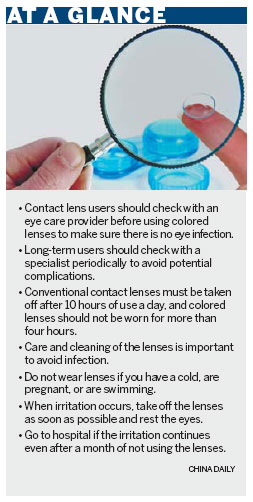Colored lenses carry risks
 |
|
Experts say the improper use of cosmetic contact lenses can cause permanent damage to the eyes. Provided to China Daily |
Treated as simple fashion accessories, colored lenses can damage the eyes, especially if they are cheap and not prescribed by qualified practitioners. Liu Zhihua reports.
Fashionable young people are increasingly turning to colored contact lenses to add a touch of glamour to their appearance. Yet, few of them are aware of the health risks of these fashion accessories that range in color from black to exotic green, blue and yellow.
Pan Siming, a journalist with Beijing-based Consumption Daily, never expected that a pair of colored contact lenses priced at 100 yuan ($15.50) would end up costing her much more - the health of her eyes.
The 26-year-old used to wear black-colored lenses she bought online, but it wasn't long before her eyes became itchy and red.
She didn't pay much attention to the symptoms until one of her relatives, a contact user who had experienced similar discomfort, told her that it might be caused by the poor-quality contact lenses and could lead to a corneal ulcer.
"I was horrified," says Pan, who has stopped wearing contact lenses.
Compared with ordinary contact lenses, colored lenses carry greater risks of ocular irritation, redness and infection, says Lu Yanyun, director of the Optometry and Glasses Center at Beijing Tongren Hospital.
Due to the layer of tinted color, they are thicker and harder than ordinary contact lenses, and additionally are less permeable, which can lead to the eyes being deprived of moisture and oxygen, Lu explains.
When the eyes, mainly the cornea, are deprived of water and oxygen, cells die and blood vessels dilate, causing syndromes such as itchiness and bloodshot eyes.
"Once these symptoms occur, people should stop wearing the contact lenses right away," Lu warns.
Moreover, death and slow reproduction of certain eye cells, such as the epithelial cells of the cornea, will make the eyes vulnerable to viruses and bacteria, says Pan Zhiqiang, a cornea disease specialist at Beijing Tongren Hospital.
"Once the epithelial cells die in large numbers it is like the door of the inner part of the eye is forced open and microorganisms can enter the inner eye, causing infection and other complications," Pan explains.
In some extreme cases, if the dead cells are endothelial cells, the damage is irreversible.

"The number of endothelial cells is fixed when we are born. Once they die, the loss is permanent," Pan says.
Contact lenses are categorized as medical devices that are inserted in the body, like artificial heart valves, and demand great care, Lu says.
In the United States, contact lenses cannot be purchased without a prescription. In China, without permission from the State Food and Drug Administration, it is illegal to sell corrected contact lenses, including colored lenses that can improve vision, according to Lu.
Yet, there's no related law concerning the distribution of the non-corrective colored lenses, which many people consider to be nothing more than a fashion accessory, Lu says.
Lu Huizhi, a graduate student at Qingdao University of Science and Technology, once ran a small business selling colored lenses to earn extra money.
He bought the products on the Internet and then sold them at a gift shop in the campus.
"Business was stunningly good. I could sell at least 80 pairs a month. The profit rate was above 80 percent," says the young man, adding most of the buyers were university students.
"Many customers think the lenses are like using makeup," Lu says. "No one seems to doubt their safety."
"Lenses of low quality are a great safety concern," says Lu, with Tongren Hospital. "Even when people feel they are problem-free, there are risks. It is vital that wearers have a proper fitting at a qualified glasses and lens store, and have regular eye exams."
Lu tells of one patient whose eyes were infected by the lenses she bought from a cosmetics store. She overlooked the doctor's suggestion that she should no longer wear cosmetic contact lenses. In the end, one of her eyes developed leukoma, an eye disease characterized by an opaque white spot on the cornea.
"Her pursuit of beauty cost too much," Lu says.
"Human eyes are very delicate, and colored lenses must be used very carefully," Lu says.
"It is very important to buy a tailored pair of lenses from qualified channels, and use them under strict direction, as well as having regular checks.
"It is also advisable that short-sighted wearers prepare a pair of glasses, and whenever they feel uncomfortable with lenses, just put the glasses on."
















